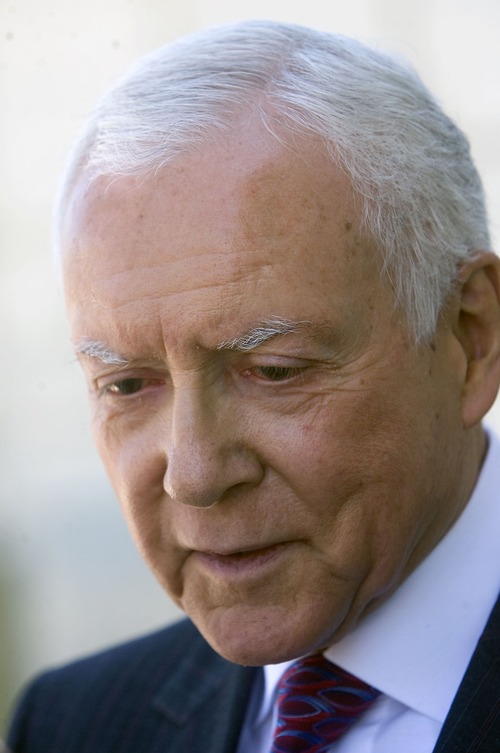This is an archived article that was published on sltrib.com in 2013, and information in the article may be outdated. It is provided only for personal research purposes and may not be reprinted.
Washington • Sen. Orrin Hatch says now is the time to reform the immigration system for the economy, for his Mormon faith and for the people here illegally.
Utah's senior GOP senator sees the bipartisan Senate proposal as a solid starting point, though he isn't ready to endorse the deal just yet. He's still reading its 844 pages and promises to suggest some tweaks.
But he appears willing to support what he couldn't under President Ronald Reagan in 1986 or President George W. Bush in 2006 — a path to citizenship.
"I think most people have come to the conclusion that we have 11 million people here who are not going to go back to their countries, many of whom are children who have never known their prior country," he said. "There's got to be a fair system that gives these people some opportunity to become good substantial citizens."
Hatch said the proposal's 13-year citizenship track satisfies his long-held demand that unauthorized immigrants should not get citizenship faster than those who went through legal channels.
And he criticized past immigration bills, most notably the law under Reagan, for being heavy on offering citizenship but light on securing the border, something he says the most recent version corrects.
Still, Hatch sought to give Reagan, under whom 3 million immigrants received amnesty, the benefit of the doubt.
"He was trying to do what's right," Hatch said, "and if I vote for this, it will be because I'm trying to do what is right."
—
A matter of faith • Hatch appeared to be moved by his conversations with Bishop John C. Wester of the Catholic Diocese of Salt Lake City and said the Catholic Church has been working "hand in glove" with leaders in the Mormon faith, of which he is a member.
"Personally, I think most religions would like to see these myriad problems resolved," Hatch said. "I know the Catholic Church would. I think the LDS Church would."
The senator said LDS officials haven't talked to him about the proposal but "they know I know how they feel."
The Church of Jesus Christ of Latter-day Saints declined to comment on the Senate bill, but Dieter F. Uchtdorf, second counselor to President Thomas S. Monson in the faith's governing First Presidency, joined other religious leaders in a meeting with President Barack Obama in March. Afterward, he told The Salt Lake Tribune that Obama's reform blueprint was in line with Mormon values, particularly in showing compassion to immigrants.
Obama has endorsed the Senate immigration plan, which was crafted by four Democrats and four Republicans. It runs the gamut from boosting the number of agents on the border to speeding up issuing visas and immediately offering work permits to most immigrants here illegally.
It also includes a permanent extension of the religious-worker visa program, which Hatch considers a personal victory. He has championed the program that offers 5,000 visas each year to religious workers — including Mormon missionaries — who will help the poor.
—
A seat at the table • The senator's fingerprints are on other sections of the bill as well. He was an original sponsor of the Dream Act, which offers a faster path to citizenship for children of unauthorized immigrants who attend college or join the military.
Hatch opposed the previous version of the bill, pushed in 2010, arguing Democrats were politicizing it, but he's glad it is in the most recent proposal.
"The concept of the Dream Act is a good concept," he said. "Why take it out on the kids?"
More recently, Hatch joined bipartisan teams that focused on providing employers with the immigrant labor they desire. He led an effort to boost the number of visas for workers with engineering, science, math or technology backgrounds from 65,000 to as many as 300,000 per year, depending on the economy. A version of this plan is in the bill, and he says he'll try to get the Senate to adopt his proposal in its entirety.
He also joined an effort spearheaded by Sen. Dianne Feinstein, D-Calif., to boost the number of migrant agriculture workers and to allow those here illegally to gain citizenship within five years.
In both of those efforts, Sen. Marco Rubio, R-Fla., served as Hatch's Republican partner. Rubio, a potential 2016 presidential candidate, is widely seen as the key figure to persuade Republicans to support the bill. He is part of the original "Gang of Eight" that created the bill, and proponents, including a group backed by Facebook founder Mark Zuckerberg, have used him as the centerpiece of an ad campaign that is running in Utah and elsewhere.
Hatch heaped praise on Rubio, who was elected in 2010, calling him "one of the best additions" to the Senate.
"He's smart, he's articulate, he's charismatic," Hatch said. "And he's Cuban, he's Latino, which certainly gives him a position of respect in the sense that he understands these communities better than most of the rest of us."
Rubio returned the compliment and urged the Senate to listen to Hatch's proposed amendments when the Senate Judiciary Committee starts debating the bill May 9.
"The bill we've introduced is a starting point for debate, but we could not have even gotten there without Orrin's work on the high-tech and agriculture parts," he said. "Orrin's expertise and leadership have been indispensable, and I hope the committee seriously considers his suggestions for how to improve the bill."
—
Dealing with dissent • Hatch's work on business-friendly portions of the bill made it all the more surprising when Salt Lake Chamber President Lane Beattie blasted Hatch and Sen. Mike Lee, R-Utah, who opposes the legislation.
Furious that Utah's senators signed a letter arguing for a multiyear debate on immigration, Beattie went as far as suggesting it was time to replace them.
He talked with Hatch by phone that same early April afternoon, when the senator distanced himself from the letter, saying he didn't want to drag out the debate beyond this year, but he did want a chance to offer amendments. By the end of their conversation, Beattie was optimistic that at least one lawmaker from Utah might support immigration reform.
"I've been encouraged with what he has told me," Beattie said. "He's anxious to get a resolution."
But Hatch knows that many within his party are not going to accept this bill.
"I believe most of our citizens respect honest, decent, hardworking people and really appreciate that immigration has been a way of life for our country from the start. What they don't respect is people breaking our laws. That is always going to be a problem," he said.
Arturo Morales-Llan is among the immigration-reform critics. He's a real estate agent from Provo who legally immigrated here in the early 1990s and has become an outspoken GOP activist against comprehensive immigration reform.
He said in a rough economy Washington should be looking out for U.S. citizens, not illegal immigrants, and he said the nation should not take actions to legalize anyone until the border is locked down and employers are checking the immigration status of each worker.
Offering any sort of legal status in concert with other reforms, he warned, would only result in more people rushing to cross the border.
"I am opposed to anything that is comprehensive. I would like to see a piecemeal deal," he said, expressing the same opinion held by Lee and Rep. Jason Chaffetz, R-Utah, among other Republicans.
Morales-Llan said Hatch's willingness to work on a comprehensive immigration bill shows he has "been in Washington too long. He is out of touch."
Hatch argues that Republicans calling for piecemeal reform are ignoring political reality. Obama and the Democratic-controlled Senate will reject any bill that doesn't include a path to citizenship for millions already here. He believes some of the opponents in his party and some of the supporters among Democrats are motivated by electoral politics. Obama received 71 percent of the Latino vote in 2012 and many expect newly minted citizens to follow a similar pattern.
"There's no doubt most of them will," Hatch said "Republicans have a job ahead of us to try to win them over, but I think we are up to the challenge."
For the senator, the potential positives outweigh the drawbacks, and he fears what will happen if this effort fails.
"I think if it is defeated, we won't do anything for another 10 years. And we'll just let what really is a festering sore continue to fester," Hatch said. "I think we've got to face up to this."
Twitter: @mattcanham —
Immigration reform legislation
The hefty immigration bill now before Congress is the first serious effort for comprehensive reform since the failed attempt during President George W. Bush's second term. The bill — which is up for its first committee debate and vote beginning May 9 — would beef up border security at the same time it provides work permits to many of the immigrants already here illegally. It also would establish a lengthy process for undocumented immigrants to attain U.S. citizenship.





